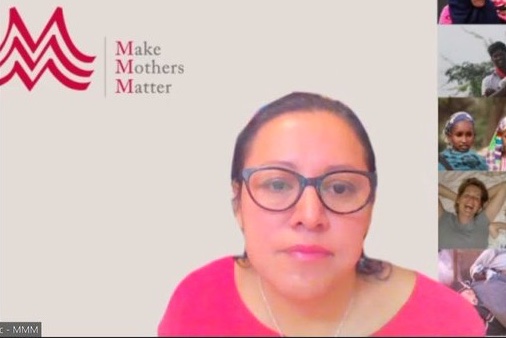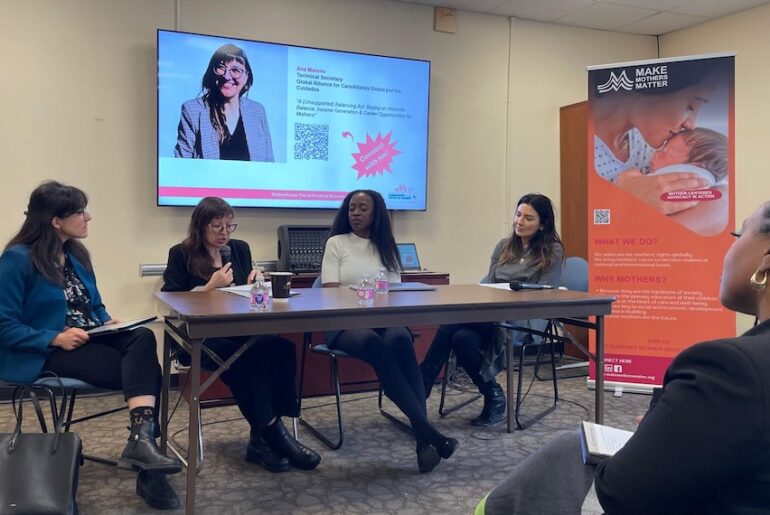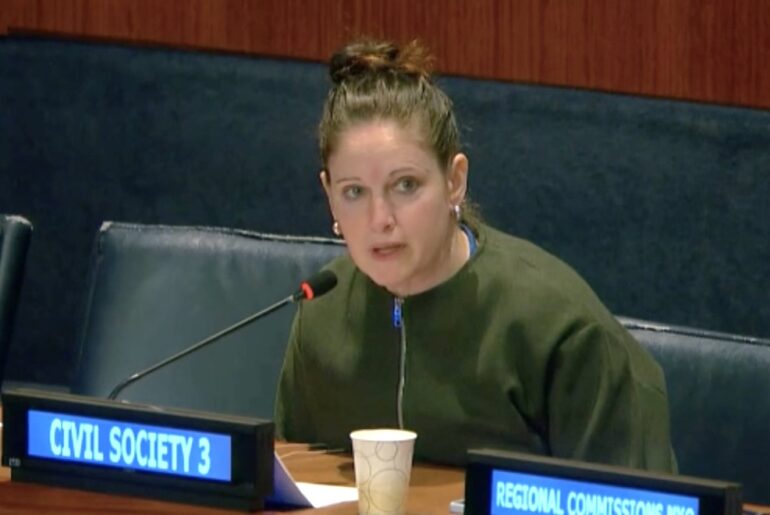MMM spotlights the actions of its associate members to redress inequity of unpaid care work
16.12.21
UN New York - The NGO Committee on Social Development regularly invites its members, i.e. representatives of ECOSOC-accredited international NGOs doing advocacy around social development, at the United Nations to present their activities on a particular topic and link these activities to the realities lived by their grassroots networks. A speaker of a UN entity is also invited to present its work in relation to that topic and respond to the first presentation.
On 17 November, Jacqueline Leduc, MMM Representative at the UN in New York, presented our work on unpaid family care work and how some of our grassroots associate members work to address the issue.

The first part of Jacqueline’s presentation explained how the inequitable distribution of unpaid family care work is a source of economic injustice for women, in particular for mothers who do the majority of the essential yet invisible work of maintaining a household and caring for children and other dependent family members. She described the ‘3R’ framework that we use in our advocacy, i.e. Recognize – Reduce – Redistribute unpaid care work, to make policy recommendations to member States and other stakeholders.
She then made the connection to the issues that three of our grassroots associated members seek to address through their actions:
- The Awaj foundation fights to protect workers’ rights in the Ready-Made Garment (RMG) sector in Bangladesh, most of whom are women/mothers. Awaj means sound/ voice in Bengali. In addition to giving a voice to RGM workers, the organisation supports local communities and provides services and training to empower women. Some of these services specifically target mothers and provide support to their unpaid care responsibilities through childcare, basic healthcare and counseling.
- In Spain, AFAMMER represents rural women at both national and international levels, defending their rights and equal opportunities. In addition to assuming the bulk of unpaid care responsibilities, rural women are often unpaid workers in their husband’s farm, or simply have no job opportunity in their area, which puts them at a significant economic disadvantage compared to women living in urban areas. AFAMMER works to ensure that Spanish women living in rural areas also have access to public infrastructure and services, in particular those that support their unpaid care work (e.g. transport, healthcare, education, childcare, etc.). Its activities also include training, access to digital technology and services that support women’s economic empowerment.
- In Cote d’Ivoire, AJAD works to improve the living conditions for women and children, in particular through a better distribution of care responsibilities. AJAD has recently conducted a survey on the involvement of fathers in the care and education of their children, and what prevents a better distribution of this unpaid work. From the outset, the African tradition has defined women and men’s roles in such a way that it would be demeaning for men to perform tasks that are not theirs. The AJAD survey shows that indeed cultural factors, customs and traditions and religious beliefs are among the main factors impacting the care gap; but economic influences (unemployment, poverty…) also play a significant role.
The AJAD survey shows that when mothers are educated and employed, i.e. economically independent, fathers tend to be much more involved: cultural stereotypes disappear, leaving room for more equal relations between women and their husbands, and more cohesion and harmony within the family which in turn fosters a better child development.
Following this survey, AJAD continues its training and awareness rising activities to economically empower mothers, especially single mothers. It has also developed various programs and works with villages and community leaders to support mothers and the involvement of fathers in family life.
Matthieu Cognac, from the International Labour Organisation (ILO), was the respondent to Jacqueline’s presentation. He recalled how the Covid-19 pandemic has not only shown the importance of Care and the Care economy, but also how it has exacerbated gender inequalities, including the ‘Care gap’. The UN Secretary General’s recently published report, Our common agenda, calls for large-scale investment in the Care economy, which is also a central pillar of work at the ILO through its “human centered agenda”.
The ILO will soon publish a report on the Care economy presenting the most recent data, but the latest and available statistics show that globally 2.1 billion people are in need of care, i.e. over ¼ of the world’s population. Based on current dynamics, the 2.1 billion figure is expected to grow in the future by another 200 million (including 100 million older persons). Because women perform the largest amount of both unpaid and paid care work (around 76% of care work), when you focus on the Care economy, you focus on women and their ability to access decent jobs, which in turn links to the eradication of poverty.
According to M. Cognac out of 184 countries, only 77 (42%) meet the minimum standards on paid maternity leave. And out of 167 countries, only 57 (39%) provide paid statutory leave for fathers. There is a lot of room for improvement in this area, as well as on universal access to early childhood care and education infrastructure and services.
Effective policies could create up to 475 million jobs in the Care sector by 2030. This would sustain economic growth, and provide a way out of informality and poverty for millions of people, especially women. It is important however that these jobs meet decent work standards in order to translate into high quality care services. We know that these policies are effective, but it is now up to politicians to move forward.
Time Poverty and the Motherhood Penalty
Unveiling Economic and Social Injustices
09.07.24
Mothers play an essential role in families by ensuring their loved ones are nourished, educated, and healthy, but their unpaid care work often leads to economic and social injustices, known
Envisioning care as a common thread to global crises
29.07.24
UN New York - Our virtual HLPF side-event brought together experts to shed light on how the various global crises we face (in particular climate change and other environmental crises,
We call for multi-stakeholder approach to recognise and support unpaid care work
21.07.24
UN New York - Participating in the meeting of the UN Economic and Social Council (ECOSOC) on care and support systems, MMM reaffirmed the principle of co-responsibility, which should underpin








